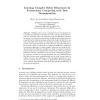Free Online Productivity Tools
i2Speak
i2Symbol
i2OCR
iTex2Img
iWeb2Print
iWeb2Shot
i2Type
iPdf2Split
iPdf2Merge
i2Bopomofo
i2Arabic
i2Style
i2Image
i2PDF
iLatex2Rtf
Sci2ools
96
Voted
EWLR
1997
Springer
1997
Springer
Learning Complex Robot Behaviours by Evolutionary Computing with Task Decomposition
Building robots can be a tough job because the designer has to predict the interactions between the robot and the environment as well as to deal with them. One solution to cope the diæculties in designing robots is to adopt learning methods. Evolution-based approaches are a special kind of machine learning method and during the last few years some researchers have shown the advantages of using this kind of approach to automate the design of robots. However, the tasks achieved so far are fairly simple. In this work, we analyse the diæculties of applying evolutionary approaches to learn complex behaviours for mobile robots. And, instead of evolving the controller as a whole, we propose to take the control architecture of a behavior-based system and to learn the separate behaviours and the arbitration by the use of an evolutionary approach. By using the technique of task decomposition, the job of deæning ætness functions becomes more straightforward and the tasks become easier to achi...
Related Content
| Added | 07 Aug 2010 |
| Updated | 07 Aug 2010 |
| Type | Conference |
| Year | 1997 |
| Where | EWLR |
| Authors | Wei-Po Lee, John Hallam, Henrik Hautop Lund |
Comments (0)

